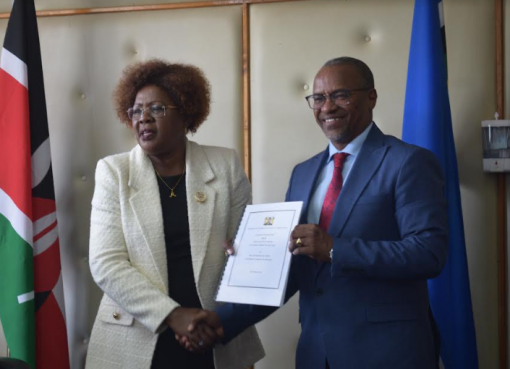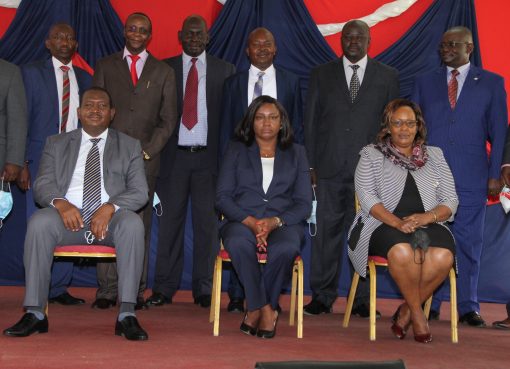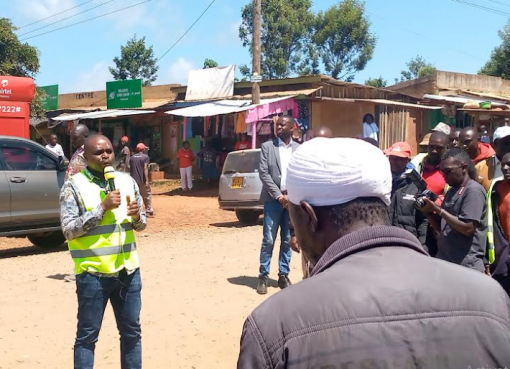With the anticipated operationalization of the new electricity transmission line from the Turkwel hydropower generation plant, West Pokot and Trans Nzoia residents are poised to reap big in terms of power supply reliability.
Energy and Petroleum Cabinet Secretary (CS) Davis Chirchir while commissioning the delivery of a transformer at Ortum Sub Station with a power supply capacity of 220 megawatts, said the future of the country is pegged on power generation that is environmentally sustainable.
Chirchir mentioned that the new Turkwel-Ortum-Kitale power transmission line will minimize power loses, noting that the North rift region has for a long time been being exposed to high power losses, since power generated from the Turkwel plant goes to waste because of the long distance.
“It has been a pity since a lot of power being generated from the plant has to be evacuated to Lessos in Uasin Gishu County miles away, before being reverted back the source for use. This line will enhance reliability of power and connectivity within the region and reduce power losses,” stated the CS.
The North Rift region has been plagued by unstable power supply, reason being the long distance in power transmission lines.
Chirchir argued that geothermal and hydroelectric power is environmentally friendly, hence good for the future generation.
“By removing these constraints that lead to power losses, we are going to reduce what we call lifeline loses. We are all concerned that the cost of power goes down. Bringing down the cost of production is what attracts investors in a country,” he said.
The CS stated that the country could be experiencing a loss of about 22 percent of power both transmission, commercial and technical losses, reiterating that with introduction of short and high-capacity routes, these kinds of losses shall be a thing of the past.
He noted that the losses are generally met by the taxpayers with the government paying for 35 megawatts for the generators, when the country only delivers about 29 megawatts to the market.
“We lose because we pay for the generators and the question is who pays for the loss of about 6 megawatts which is a lot to be paid by you and me. We have just been from Menengai, where they started feeding the national grid with about 35 megawatts, but by the time that power reaches the load centres, or where consumption happens, we could be delivering about 28 or 29 megawatts, which is a loss of about 20 percent. So, the question is who will be paying for the 6 megawatts deficit?” he posed.
He said currently the world is facing a global challenge occasioned by climate change and all the power generated from the North Rift is green energy and will help the country overcome the global warming challenge.
“Turkwel is 100% green energy hydro-power generated, the Menengai is also 100% green from geothermal generation, hence we are on the right footing as a country,” argued the CS.
He maintained that modern industries are concerned with the environment and it will reach a time when everybody will be inquiring whether the products being consumed were manufactured using green energy.
“It will reach a time when we will ask; was this steel manufactured using green energy, was these shoes we are putting on, manufactured using green energy, was these shirts we are wearing manufactured using green energy or is the food we are consuming processed using green energy?” posed Chirchir.
The CS reiterated that for the last five years, climate change has been a major challenge globally, while Kenya’s hydrology, which supports about 35% of its power generation has been greatly affected.
“Our major power generation companies have been delivering only about 30% of what it should be delivering due to reduced water levels. The issue of climate change should be highly taken into consideration because various communities across the world have lost their means of livelihood due to drought and other disasters such as cyclones,” said Chirchir.
He said that once the Turkwel-Ortum Kitale powerline starts its operations, we shall be able to expire the diesel power generation, which is not very sustainable to our environment.
Chirchir called on the contractor of the two power stations that is Ortoum and Kitale to expedite their works so that by the end of October the line should be operational.
“Let us speed up our work so that in the next 45 days we should deliver these sub-stations, for those who have visited Turkwel will attest that we have a lot of water, until downstream the residents are even asking us to give supply them with the commodity. Therefore, we ask you to help us push down more power that can be harnessed into the national grid,” Chirchir urged the contractors.
He acknowledged that there has been an outcry amongst communities neighbouring power generation areas that they lack electricity noting that the problem will be progressively solved once more power lines are installed.
“Traditionally in power generation areas, you will find out that places are so remote such that there is no habitation, thus it will be uneconomical to step down the power because there will be no population to consume it. This is a matter of economics,” explained the CS.
He however observed that the areas around Turkwel are experiencing a surge in population, therefore a need for establishment of some sub-station for the community to benefit from the power generated from their area.
He reiterated that the last mile electricity connectivity programme was still on course and the government is committed to ensuring that the percentage moves from the current percentage to 100.
“In 2013, we were at 23% and we have moved to 77% today. We need to move to 100% in about the next 3 years. The communities from around, where we generate the power should enjoy from the resource that is generated from their locality,” assured the CS.
According to Kenya Electricity Transmission Company Limited (Ketraco), the new line covers a distance of 138 kilometres and the project was to be completed in 2016, but was delayed due to logistical issues that have since been ironed out and the current contractors are set to complete the entire project before the end of the year.
By Richard Muhambe and Anthony Melly





